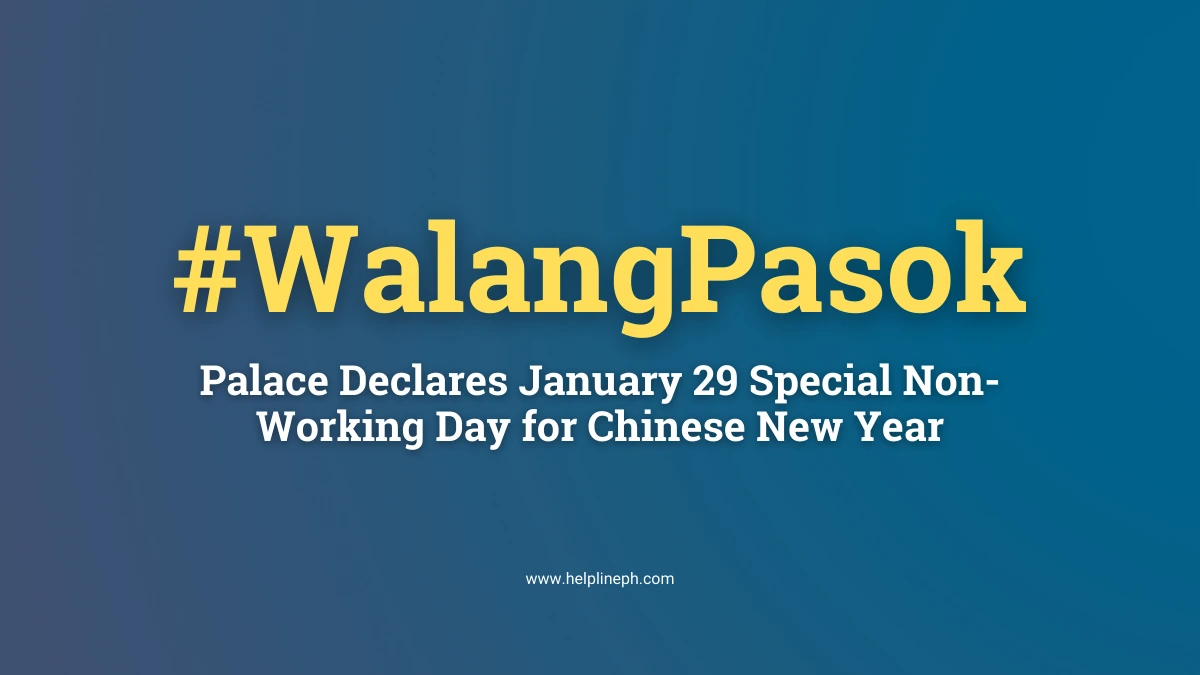The Philippine government has officially declared January 29, 2025 (Wednesday) as a special non-working day in celebration of the Chinese New Year. This was announced under Proclamation No. 727, signed by President Ferdinand R. Marcos Jr.
The declaration honors the importance of Chinese New Year, also known as the Spring Festival, which is celebrated not only by Chinese communities in the Philippines but also by Filipinos nationwide. The holiday provides an opportunity to appreciate the cultural and historical contributions of Chinese-Filipinos to the country’s rich traditions.
Why January 29 is Special
The Chinese New Year is one of the most festive events globally and in the Philippines. This holiday marks the beginning of the lunar calendar, which follows traditional Chinese customs. The President recognizes that this occasion is not just for celebration but also for promoting family ties, unity, and cultural understanding.
By making it a non-working day, Filipinos are given the chance to participate in Chinese New Year festivities, enjoy family reunions, and take a well-deserved break.
What Does “Special Non-Working Day” Mean?
When a day is declared a special non-working holiday, it generally means:
- No work for most employees: Workers in both public and private sectors are not required to report for duty.
- “No work, no pay” rule applies: Employees who don’t work on this day won’t receive pay unless their company policy states otherwise.
- Those who do work are entitled to extra pay, following rules set by the Department of Labor and Employment (DOLE).
Other Holidays in 2025
Aside from January 29, Proclamation No. 727 lists other holidays for 2025. These include regular holidays, special non-working days, and special working days:
Regular Holidays
- New Year’s Day – January 1
- Independence Day – June 12
- Christmas Day – December 25
Special Non-Working Days
- All Saints’ Day – November 1
- Chinese New Year – January 29
- Christmas Eve – December 24
Special Working Day
- EDSA People Power Revolution Anniversary – February 25
The complete list of holidays ensures Filipinos can plan ahead for work breaks, vacations, or important events.
Promoting Cultural Diversity
Declaring Chinese New Year as a holiday highlights the government’s effort to promote cultural inclusivity. The Filipino-Chinese community has been a significant part of the country’s history and economy. This move strengthens ties among cultures and fosters mutual respect among citizens.
Frequently Asked Questions (FAQs)
Will private companies be required to follow the holiday declaration?
Yes, private companies must comply. However, employees who work on special non-working days should receive extra compensation as mandated by labor laws.
Why is Chinese New Year celebrated on different dates each year?
Chinese New Year follows the lunar calendar, so its date changes annually based on moon phases.
Is January 29 the only special non-working holiday in January 2025?
No. January 1 (New Year’s Day) is a regular holiday. January 29 is an additional holiday for Chinese New Year.
How does this holiday impact businesses?
While businesses may temporarily pause operations, holidays often boost tourism and local economic activities during celebrations.
Conclusion
The declaration of January 29, 2025, as a special non-working day for Chinese New Year demonstrates the government’s recognition of cultural heritage. This holiday allows families to celebrate traditions, enhances Filipino-Chinese relations, and promotes inclusivity.
Plan your calendar now and take advantage of this meaningful holiday to immerse yourself in the festivities!






